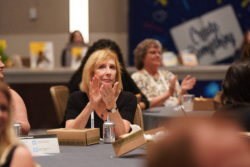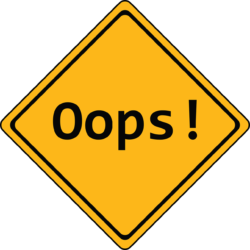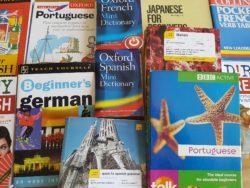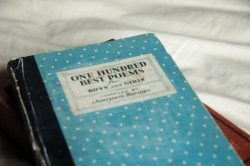Arlene Miller's Blog, page 19
May 13, 2022
What Happens in Orlando — Gets Printed in This Blog!
 photo c/o Independent Book Publishers Association. Used with permission.
photo c/o Independent Book Publishers Association. Used with permission.I hadn’t been to Orlando since I moved to Florida in September 2019, until two weeks ago when I attended the Independent Book Publishers Association (IBPA) Publishing University. Yes, I have already written a post about it, but that was the virtual portion. This time I got to put on real clothes and drive (in the traffic) to Sea World where the hotel was.
It was a little challenging for an introvert like me to be among 300 or 400 people whom I had never met in person. I knew the people who run the organization from Zoom, but I had never met them. I ran into one person from Florida Writers Association who had interviewed me for their podcast about a year ago. And I finally got to meet several members of Florida Authors and Publishers Association, where I am a new board member. It was nice to meet these people in person; I have been zooming with them for a while.
The hotel was beautiful, although I spent very little time in the room that one night I stayed. It was one of those hotels where the rooms surround the downstairs where the ballrooms and restaurants are. The ones with the glass elevators and little balconies outside the rooms. It is a few levels above the usual places I stay!
The swag bag was beautiful and one that I will be using . . . full of the usual swag, including a really cute pair of sunglasses I am wearing when I drive. I think I like them better than my Ray Bans!
The first session was for first-time attendees. I felt weird not knowing anyone, but that is where I found the woman whose podcast I had done. So I joined her for lunch and the keynote address, which was the next thing on the agenda. The boxed lunches were really good and too much for even me to eat, but I did okay: a huge sandwich, macaroni salad, chips, an apple, and an enormous chocolate chip cookie.
The keynote was given by an entertaining speaker who has done well in a short period of time with children’s books with a social message.
Then I had to make my first choice: negotiation, project management, Amazon, or titles?? You guessed it. I can’t get enough Amazon information. Very glad I chose that one because it got me going on the new A+ content for Amazon. You can see mine if you look at the paperback versions of my orange workbook, my yellow grammar book, or my comma book on Amazon. Scroll down and you will see From the Publisher. That is the A+ content, which I worked very hard at this week.
The Day One wrap-up was next with coffee and pastries. That evening was the book awards ceremony, which I had not signed up for, since I had not entered any books. I signed up very last minute, right before my new friends from my publishing group invited me to go with them to a sports bar in the hotel. I was stuck going to the awards with mostly strangers. The food was good, but not for the money it cost!
So I didn’t get too much time to spend in my nice hotel room. And it was up early the next morning for breakfast and table top networking at 7:30 a.m. You could sit down and start a topic or you could join a table that had a topic you were interested in. Since most of the people at the conference were small publishers who publish other people’s books (many of them also write), and I am an author/publisher who publishes only my own books, I wanted to talk to other author/publishers and should have started a table with that topic. But I didn’t know if anyone would join me, so I thought I would try it at lunch where there was supposed to be more table t0p networking of the same type. But that never quite happened.
I sat with some people talking about marketing and then moved to a table talking about distribution, two other good topics.
After breakfast (continental, but lots of good choices) there was a general session about benefits provided by IBPA — and there are many. Discounts on lots of publishing-related services. I might add here that the main room was surrounded by the sponsors who each had a table. There must have been at least 25 of them. There was also a bookstore with some of the members’ books, located outside in the hallway.
Decision time again: book design, hybrid publishing, consumer data, or reviews. It was between design and consumer data. I chose book design, and was a little disappointed in the speaker. None of those topics really grabbed me.
Lunch was a repeat of the day before. There was a choice of three different sandwiches, so I picked a different one. No complaints. And the macaroni salad was different — and much better — this day.
Two more sessions to select after lunch before the closing session. For the first one, the choice was marketing to schools, inclusivity, and relationships. I chose marketing to schools, since that is an area of interest to me. My books do sell to schools, high schools and mostly colleges. The session was aimed at K-12 but was still interesting.
For the second session I could choose between translating children’s books, thinking like Amazon, audiobooks, or small presses. Yup, I chose thinking like Amazon, which was probably the best session I went to.
Since checkout time was 11 a.m., I had already checked out that morning, and my things were in my car. The final session before heading home was the wrap-up and raffle. There were lots of great raffle gifts … but I didn’t win anything.
Everything was kept very much on schedule the whole weekend, and I was glad since leaving at 6 p.m. meant I probably wouldn’t have to drive home in the dark. I didn’t, and once I got out of the Disney area, there wasn’t that much traffic. But once the traffic cleared, the skies didn’t, and the pouring rain followed me all the way home.
Glad I went? Yup! Going again next year? It’s in San Diego, so I don’t know . ..
May 5, 2022
Grammar Goofs as Heard on TV
I have been paying attention to television news and commercials (and chyrons, where I have seen a couple of misspellings recently). Here is some of what I have heard! Of course speech is different from writing, and you can’t go back and correct speech, so the guilty probably (hopefully) would not have written this way.

 and my favorite from a TV commercial for a jewelry store:My mother handed down her diamond necklace to me, who wasn’t with us anymore.
and my favorite from a TV commercial for a jewelry store:My mother handed down her diamond necklace to me, who wasn’t with us anymore.
April 27, 2022
Publishing University Fun!
The Independent Book Publishers Association (IBPA), located in Southern California, supports author/publishers and small publishers. Author/publishers write and publish their own books. Small publishers publish other people’s books (and maybe their own as well). The IBPA is the umbrella organization for about a dozen regional associations across the United States, two of which I am a member of: BAIPA (Bay Area Independent Publishers Association in California) and FAPA (Florida Authors and Publishers), where I just joined the board. Although I moved away from California in 2019, I still belong to BAIPA because I love the people and the meetings, which have been on Zoom for a couple of years and for which there will continue to be a Zoom option.
publish their own books. Small publishers publish other people’s books (and maybe their own as well). The IBPA is the umbrella organization for about a dozen regional associations across the United States, two of which I am a member of: BAIPA (Bay Area Independent Publishers Association in California) and FAPA (Florida Authors and Publishers), where I just joined the board. Although I moved away from California in 2019, I still belong to BAIPA because I love the people and the meetings, which have been on Zoom for a couple of years and for which there will continue to be a Zoom option.
Every year, IBPA has a conference, called Publishing University. Its location varies from year to year: San Francisco, LA, Chicago, NewYork…and this year Orlando, so I don’t even have to fly. And this is the first Publishing U that I have attended. I will be going to Orlando this weekend, and I spent three days last week at the virtual part of the conference, which was wonderful.
However, this year many members complained about the location: With its book banning, “Don’t Say Gay” law, and hoopla about critical race theory, they felt that Florida was hardly the place to celebrate book publishing. Conferences are planned a long time in advance, so there wasn’t much that could be done about it. The IBPA board considered what they could do, and they prepared a position paper on the Parental Rights in Education and the Individual Freedom laws and sent them to the Florida legislature. The IBPA stands for inclusivity and had strong feelings about LGTBQ+ rights and teaching real history n the schools.
I was surprised at how good the virtual part of the conference was. After two days of workshops (our choice of three during any one session), we could have one-on-one conversations with various experts. My two major concerns were
Would having a distributor for my books be advantageous and/or feasible? What is going on with Amazon Advertising and am I being priced out?
What is going on with Amazon Advertising and am I being priced out?I took a workshop about All Things Amazon and talked to two experts about the advertising, which I have used (pretty successfully until lately). I discovered that I need to work much harder creating my Amazon ads. It is a complicated thing! Keywords and bids…my ads need some attention!
I talked to a couple of people about distribution and decided it was not financially feasible for me right now. I had a distribution contract about 10 years ago, and I remember at that time looking at the terms and saying Nope.
There was a panel of successful indie authors. I said to myself, They sound pretty successful. I wonder if I am doing as well as they are.
Another workshop dealt with all things audio and video from the simplest iPhone video to podcasts and book trailers. The speaker advised us all to just pick one thing and do it. Good advice when these types of events can really overwhelm one!
The keynote talk on the second day was a panel talking about book banning. The panel comprised mostly librarians. Seventy percent (sounds too low to me) of Americans oppose banning books . The majority’s moral compass points to equality. And, as one speaker said, “Book banning is never successful for a long period of time in a wide area. It might work for a short time in a localized area.”
Editorial Sensitivity in Publishing, Cover Design, and Getting into Chain Stores were other talks I attended…and for the ones I couldn’t attend, they were recorded and are all available to us for a month.
And now I am off to Orlando for part 2, and to meet in person a bunch of people I have seen only on Zoom!
April 22, 2022
Lost in Translation…
——————————————————————————————–
Lost in Translation …or obscured by transcription, adrift in adaptation, concealed by rendition
…or obscured by transcription, adrift in adaptation, concealed by renditionBy Audrey Kalman
I took French in seventh grade. My rural junior high school offered a choice between that or German. Thus began my romance with French—although French may seem less romantic once you learn it derives from Vulgar Latin (which simply means spoken, non-Classical Latin). I dreamed of traveling to Paris. Failing that, I dreamed of a handsome French exchange student coming to live with us. I even created a French-inspired pen name: Cecile Marchand, a mash-up of my middle name and the French word for “merchant.” I took French through college, becoming proficient enough to read Camus, Sartre, and Flaubert in the original and get around on a trip to France after I graduated.
Then I never spoke it again.
My South American boyfriend attempted to teach me Spanish in my mid twenties, but by then French was imprinted in my brain as “the other language” of this native English speaker. I had to keep stopping to think, gracias or merci? hola or bonjour? It didn’t help that he teased me about my accent. I never achieved anything close to Spanish fluency, which I regretted when my kids were little sponges and everyone touted the benefits of getting an early start on a second language.
So today I am at the mercy of translators, not only for Spanish but for any of the world’s 7,000 or so other non-English languages.
It’s hard enough to get our words right even when we’re speaking the same language. We talk past each other. We say one thing and the listener hears something else. Or we outright say what we don’t mean. Layer onto this same-language communication challenge the task of, say, being a diplomat charged with ratcheting down an armed conflict, and suddenly the tremendous burden on the translator becomes obvious. Many a book and movie plot has hinged on a translator slyly shifting the speaker’s words to change the course of history. And there are real-world examples of diplomatic mistranslation.
The subtleties of translation play out in smaller, less dramatic ways. Recently, I’ve been closely reading and analyzing short stories, some written originally in Russian and Chinese. As I examine how each phrase stirs me as a reader, I have a niggling question: Is this exactly how the phrase would strike me as a native speaker? Probably not. Recently, for example, a new translation of Felix Salton’s 1922 book Bambi, a Life in the Forest, which became the basis of the popular Disney movie based on its first translation, was translated afresh. The new translator, Jack Zipes, told Publisher’s Weekly he was shocked at the book’s dystopian vision, a story, he said, that “was never intended for children.”
Inspired by thinking about translation, I returned to my dog-eared college copy of Michel Déon’s Les gens de la nuit (The People of the Night). I could still understand the first sentences without benefit of translation: “This past year,” the book begins, “I stopped sleeping. I couldn’t have said why.” To check my comprehension, I typed them into Google Translate, which returned, “That year, I stopped sleeping. I couldn’t confess why.” To my ear, “confess” sounds wrong in this context. But do I really know, as a college-level French speaker who abandoned the language for decades, exactly which English words Déon would have chosen?
Language, it turns out, is not just language. Sure, it consists of words, phrases, sentences, and paragraphs put together by rules of grammar and syntax. But language comes with culture and history baked in. When we speak, history echoes. Concepts foreign to a culture often have no words in that culture.
So, on the translator’s shoulders falls not only the need to know words but the necessity of putting down stepping stones the reader can cross to understanding, conveying not only the meaning of individual words but the weight, intention, and nuance behind them.
Sometimes I think these dedicated wordsmiths may be the bridge builders holding our fragile world together.
April 14, 2022
Do I Capitalize After a Colon?
 Do you capitalize the word that comes directly after a colon? Sometimes you do; sometimes you don’t. Here are the guidelines:
Do you capitalize the word that comes directly after a colon? Sometimes you do; sometimes you don’t. Here are the guidelines:
1. Do NOT capitalize the word after a colon if it doesn’t begin a complete sentence.
My dog knows these commands: sit, stay, and rollover.
2. Do NOT capitalize the word after a colon if it begins a sentence that explains the words before the colon.
I like most of my classes at school: math is not one of them!
3. DO capitalize the word after a colon if it begins a sentence that needs emphasis.
Whenever I went out to play as a little kid my mother said this to me: Don’t you dare get into any fights.
4. DO capitalize the word after a colon if two or more sentences follow the colon.
I do three things every morning as soon as I get up: First, I put on the coffee. Next, I open all the shades. Finally, I feed the dog.
5. DO capitalize the word after a colon if it begins a quote that is a sentence or more.
The mayor said this in his speech: “Our community is strong, and we will get through this crisis.”
6. DO capitalize the word after a colon if a short introductory word precedes the colon.
Remember: Take your second left to get to the freeway.
Announcements:Next week, we will have our second guest post by Audrey Kalman. She is an amazing writer, and you will love this post as much as you loved her first one.The week after that (the last week of April), I will be at the Independent Book Publishers Association Conference in Orlando. I will either run a “Best Of” post or a post live from the conference. I am still collecting grammar goofs you hear on TV, or read in the newspaper or a book, or hear someone say. I have collected some real winners! If you find one, please send it in the comments or to: info@bigwords101.com. I will do a future post about them.
April 7, 2022
QUIZ: Italics and Quotation Marks
 During the past several weeks, I have written several posts about when to use italics, when to use quotation marks, and how to use other punctuation with quotation marks. Here is a little quiz on the information in those posts:
During the past several weeks, I have written several posts about when to use italics, when to use quotation marks, and how to use other punctuation with quotation marks. Here is a little quiz on the information in those posts:
Fix the following sentences by putting in quotation marks, italics, or adding punctuation in the correct places around quotation marks. Some of the sentences may be correct as it:
1. Please look up the definition of the word defenestrate.
2. I would like my steak served medium rare and a la carte.
3. I flew on to Miami on a Boeing 757.
4. I was excited to see the movie Star Wars for the tenth time!
5. I am hooked on the television show The Wagner Family, and my favorite episode is What Will Happen Next?
6. Please turn to Chapter 2, The Beginning of World War I.
7. I just received my tickets for the play Hamilton.
8. I hired her because of her can do attitude.
9. She said that she thought it might rain this afternoon.
10. Did you read the article in The New York Times called Children and Technology?
11. Please just answer yes or no.
12. I am running late she said, and I will probably miss he beginning of the movie.
13. The box was marked fragile, so I carefully brought it to the closet and put it in the back.
14. My kids constantly ask, Are we there yet? when we take a long trip in the car.
15. She kept saying, You are thinner than I am; it drove me crazy!
Scroll for the answers…..Down
Down
Down
Here!
1. Please look up the definition of the word defenestrate. (Italics for a word used as itself in a sentence.)
2. I would like my steak served medium rare and a la carte. (Correct as is. A la carte is common enough not to need italics – except when it is used as itself in a sentence, like this answer!)
3. I flew on to Miami on a Boeing 757. (Correct as is. Boeing is not italicized. It is the brand name, not a specific name given to a plane, like Spirit of St. Louis.)
4. I was excited to see the movie Star Wars for the tenth time! (Titles of movies are italicized.)
5. I am hooked on the television show The Wagner Family, and my favorite episode is “What Will Happen Next?” (Television shows are in italics. Episodes are quoted, and here the question mark is inside the quotes because the quotation mark goes only with the title.)
6. Please turn to Chapter 2, “The Beginning of World War I.” (Names of chapters are in quotation marks. The period always goes inside the quotation marks in American English, no matter what.)
7. I just received my tickets for the play Hamilton. (Title of plays are in italics.)
8. I hired her because of her “can do” attitude. (Can do has an unusual use in the sentence.)
9. She said that she thought it might rain this afternoon. (Correct as it is. Even though the word said is there, it is an indirect quote, not a direct quote of what she actually said.)
10. Did you read the article in The New York Times called “Children and Technology”? (Newspaper names are in italics, and articles are in quotation marks. The question mark is outside the quotes because the question is the entire sentence.)
11. Please just answer yes or no. (In this usage, yes and no do not need to be quoted. Here is a different example: She replied, “yes.” Here you need quotes.)
12. “I am running late,” she said, “and I will probably miss the beginning of the movie.” (Quotes around the exact words she said. Commas after late, and said. Commas and periods always go inside the quotation marks.)
13. The box was marked “fragile,” so I carefully brought it to the closet and put it in the back. (Quotation marks are used for words that follow labeled or marked. Comma inside the quotes.)
14. My kids constantly ask, “Are we there yet?” when we take a long trip in the car. (Quotation marks around the direct quote. Question mark inside quotes because the question is the quoted portion of the sentence only.)
15. She kept saying, “You are thinner than I am”; it drove me crazy! (Quotation marks around the exact words she said. Semicolon always goes outside the quotes.)
Looking for grammar goofs!I am collecting grammar goofs for a future post. If you see something in a newspaper, etc., or you hear something (most likely on the news) that is not correct, please send it to me. You can send me the source, but I will not be posting those. You can e-mail it to me at the website e-mail (info@bigwords101.com) or you can send it as a comment if that is easier. They will not be posted as comments though. Thanks!
March 31, 2022
It’s National Poetry Month!
 Guest blogger Pat Stanford is the author of two double-gold-medal -winning poetry books: Proverbs of My Seasons: Poetry of Transition (DocUmeant Publishing 2019) and A Motley Miscellany: Misfit Poems That Fit Together (DocUmeant Publishing 2020). She is a board member and former president of Florida Authors and Publishers Association.
Guest blogger Pat Stanford is the author of two double-gold-medal -winning poetry books: Proverbs of My Seasons: Poetry of Transition (DocUmeant Publishing 2019) and A Motley Miscellany: Misfit Poems That Fit Together (DocUmeant Publishing 2020). She is a board member and former president of Florida Authors and Publishers Association.
************************************************************
It’s National Poetry Month!
Do you read poetry? If not, why not? Reasons to read it can include learning something new about a place or a person, especially the poet; learning how to express something that may never have been expressed that way before; or learning that a poet can find ways to see the beauty in things when we can’t.
One of my poetry groups meets twice a month via Zoom (although they have been threatening to go back to in-person meetings). Well-known poets are chosen by the group members, and one of us does research on the poet. On the first Monday of each month, the member who did the research tells the group about that poet. And then everyone shares their favorite poem by that poet.
On the third Monday of the month, we write poems after being given themes, but being rebel poets, we sometimes do not do the theme. As long as we are actively trying to write poetry, it’s all good.
I wonder if going to a reading would inspire more interest in reading poetry. But now we are still dealing with covid-related illness and the threat of more isolation. For me this means I will turn to more to poetry to read. Or to write. But I look forward to doing readings again.
If you write poetry, do you read other poets’ work? Many do not. Why not? Are they jealous that someone else’s work might eclipse their own? Or do they think it is not interesting or relevant to what they are writing?
At signing events, I get people at my table who say, “Oh…poetry. I don’t understand poetry.” I tell them, “I mainly write for fun, and you will understand mine. I don’t write confusing, pretentious, and boring poems.” I’ll open the book, turn to any one of my poems, and hand the book to the person who needs fun poetry.
Here’s an example: I call this one “Geezer.”
I had a thought, it went away.
I had a wake for it today.
It came, it went; I could not recall
what I had thought before at all.
I mourn this thought as though a friend –
so many thoughts have found such an end.
If you are over 50, you are probably either laughing or at least nodding your head knowingly. And laughter is always good. I wrote that two years ago during National Poetry Month. I was challenged by the above poetry group to write a poem every day. And I did. I think I was the only one who did!
So, do yourself a favor this month, which happens to be National Poetry Month. Read some poetry. Better yet, try to write some!
March 25, 2022
Where Does the Comma Go? Using Quotation Marks with Other Punctuation
 Hmmm….Does the period go inside the quotation marks? Or does it go outside? Where does the question mark go?
Hmmm….Does the period go inside the quotation marks? Or does it go outside? Where does the question mark go?
Standards for using quotation marks with other punctuation differ in American English versus British. But the standards are pretty easy. Here are the guidelines for using quotation marks with other punctuation — American style.
1 Commas and periods ALWAYS go inside the quotation marks. It doesn’t matter if the quote is the whole sentence or just a few words at the end.
“I hear you got promoted,” said Joe.I wrote a short story called “The Odd Duck.”2. Semicolons and colons ALWAYS go outside the quotation marks. These punctuation marks aren’t usually used with quotation marks, but that is the standard if you should have such a construction.
Read the story “The New Doll”; write a summary of the story for homework.3. Question marks and exclamation points are a little different but treated alike. If the question mark (or exclamation point) belongs to the entire sentence, it goes outside the quotation marks. If the question mark (or exclamation point) belongs just to the quoted material, it goes inside the quotation marks. AND, if both the entire sentence and the quoted part are both questions (or exclamations), the default place to put it is inside the quotation marks. Do not use two question marks! (You can also, of curse, rewrite the sentence to avoid the issue.)
I just heard Miguel ask, “Are we there yet?”Did I just hear Miguel say, “I hope we get there soon”? (Whole sentence is a question but quoted part is not.)Did I just hear Miguel ask, “Are we there yet?” (Both quoted section and whole sentence are questions. Default place for question mark is inside.)And it is that simple.
—————————————————————————————————————–
Kind of late notice, but if you happen to be near Venice, Florida, I will be exhibiting my books at the Book Fair on Saturday, March 26 from 9-3. Tent 6.
Coming Soon to this blog:
Quiz on Italics and Quotation Marks
Guest post for Poetry Month: April
March 14, 2022
Reviewing Another Author’s Work
Jags Arthurson is the pen name of a Brighton, UK writer. Jags has been a research chemist and company director. He has lived and worked in over 40 countries. His novel, the crime thriller Pagan Justice , is available on Amazon with all proceeds going to charity.
*************************************************************************************************
From time to time, especially if you are in a writers’ group, you may be asked to review another’s work in progress. There are three main reasons to do this.
To help improve their workTo help you improve your own work Solidarity with fellow writers
Solidarity with fellow writersYou may be tempted to refuse because, for instance, “This is not my genre. I write gung-ho action adventures and she writes silly chick lit.” Or “I’m just a newbie writer. I’m not qualified to comment on anybody else’s work.”
I would urge you to reconsider. You never know what you might learn. You might pick up tips on how to give your own action hero more emotional depth or improve a sex scene. The chick lit author, repulsed by the violence in the thriller, may still learn how better to describe physical interactions or add some realism to the heroine’s near-death car crash.
Another reason for refusing may be time pressure. “I am too busy with my own writing.” True. We all are. But it is nice to get useful feedback on our work. Isn’t it only fair to reciprocate? And a well-structured review can save you hours of rewriting time … more than returning your own time investment.
So what does a good review look like?
A Good Review Should:Encourage progress. Writing can be a lonely job, and a writer rarely knows if their work is any good. It is easy, especially for a new writer, to become discouraged and give up. The reviewer’s comments should always bear this in mind and should be made as positive as possible. The review should not be just about finding faults, but good work should be praised. All reviews MUST be constructive (see below).Spot Typos, etc. but … Typos are the “low hanging fruit” for any reviewer, but remember that this may be an early draft. There is little point in identifying all the spelling and punctuation errors if the whole work is going to be rewritten anyway. It can be useful if you notice a writer repeats a mistake over and over (there instead of their) as that is something unlikely to be corrected in a rewrite. Anyway, a half decent editor will pick up the typos in a final draft.Concentrate on the “basics.” There are a number of key elements to good writing (see below) without which it doesn’t matter how good the English or how great the spelling or sentence structure; if these are not right, the story will not be read.Be a learning process. Sometimes when we review our own work, something may just feel wrong with it, but it is easy to ignore it on the grounds that “I’m just being fussy.” However, as a reviewer, you are morally bound to dig deeper and, once the fault is identified, you may even recognise the same failing in your own work and thus improve it in the future.Rules of Constructive ReviewsFaults. It is fine to find (genuine) fault in another’s writer’s work, but what is NOT all right is to stop there. There are more steps to complete:
State the fault.Say why it is a fault.Possibly suggest or give examples of how the fault may be rectified.Example: The author wrote
Mike was angry at Mary.
Fault: This is telling (show, don’t tell).Why: Telling does not engage the reader, whereas showing (emotion) does.Suggestion: What does Mike feel/do? Mike leapt to his feet and thrust a finger at her …Obviously, an experienced writer will be familiar with much of this so, for instance, a simple “sdt” (show don’t tell) will often be sufficient in many places.
Destructive Criticism. It is NEVER acceptable to make comments such as, “This is rubbish,” even if you then explain why. You can say something like “I, personally, hated this character,” because if you do it’s a reasonable assumption you will not be alone. You must then say why you hated them … with helpful suggestions that may attract a few more readers to the final version.
What to ReviewIf somebody gives you, say, a 160,000-word novel to review, you are entitled to refuse if it is too much for you to handle. But remember, in the near future, you may want them to review your 190,000-word novel!
You must decide with the writer how much you are prepared to do. Five thousand words is a reasonable minimum to give a good feel of the work, allowing you to understand story and character arcs.
If the 5,000 words are not from the beginning (and you are not familiar with what went before), the author should also provide a “context synopsis,” describing the characters, the environment (era, location, etc.), and the story so far.
The author may ask specific questions about some aspect of the work. (Does it work? Is it credible? How could I …?) This does not restrict you to just those topics, but you should at least cover them.
The BasicsGood writing follows a number of guidelines (not rules).
Story Arc. Does the story move along realistically? Does it have a “proper” structure?Hook.First 5%. Introduce characters, motives, needs, wants.5-25%. Set up the “adventure.”25%. 1st major turning point: “Accepts the challenge.”50%. 2nd major turning point: “Starts the fight back.”75%. 3rd major turning point: “Beginning of the end.”75-95%. Finale.Last 5%. Denouement: Continuing life of main characters.Place and time. Is this clear? Even if it’s not relevant, readers like to know.Personal descriptions. Relevant details must be revealed as early as possible. Readers become upset if the six-foot, blue-eyed blond character they imagined in chapter one turns out to be five feet tall and bald in chapter seven (unless there is a good plot reason for the deception).Point of View. Very important. The narrator must be consistent. Any head-hopping, etc? Ensure, for example, that the narrator is not revealing things they can’t know, etc.Character arc. Do the characters evolve and learn? Are they obviously better (or worse) at the end of the tale? Do they always act within character?Are they interesting? (Grit, Wit, and “It”) If not, what are they lacking?Check for silly mistakes. (Character killed in chapter 3 appears in chapter 9. Inconsistency of names, places, descriptions, spellings, etc.) Common mistakes include, for instance, smoking three cigarettes during a conversation that lasts a page.Personal expertise. If, for instance, you have technical knowledge applicable to the story, correct inaccuracies (calling New York’s airport JFK in a novel set in 1960).Writing Style. Watch out for the old traps: telling instead of showing, hanging modifiers, unclear descriptions, jargon unlikely to be familiar to readers, etc.Dialogue. Is it realistic? Is it always clear who is speaking? Correct use of speech tags and avoidance of editorialising speech tags (“He exclaimed emotionally.”)Timing and sequence. Are sequences correct? Unless there is a reason, e.g., flashbacks, etc., everything should happen in order, even down to micro-details: He read the document that he had previously taken from the desk should be He picked up the document and read it.Lack of conflict makes a boring story. Every chapter, paragraph — almost every line — should have conflict.InternalPerson versus personPerson versus environment (weather, animal, society, etc.)Any author will tell you how lonely the job can be, and just the fact that a fellow writer has picked up and put some effort into our “baby” can be a tremendous psychological boost. Try it. You never know; you might like it.
March 10, 2022
Uh-Oh: Trademark Trouble!
 In 2016 I wrote and published a book called Fifty Shades of Grammar: Scintillating and Saucy Sentences, Syntax, and Semantics from The Grammar Diva. The book is a collection of fifty of these blog posts — from 2016 back to 2013.
In 2016 I wrote and published a book called Fifty Shades of Grammar: Scintillating and Saucy Sentences, Syntax, and Semantics from The Grammar Diva. The book is a collection of fifty of these blog posts — from 2016 back to 2013.
Yes, I did wonder if I was violating any laws by “stealing” the Fifty Shades phrase. So I asked around to see what my writing and publishing friends thought. I remember also running it by a lawyer acquaintance. And, of course, I looked on Amazon to see if anyone else had taken the phrase for a book title. I saw that there were many. So I felt pretty safe calling my book Fifty Shades of Grammar. It went on to win a book award from The Bay Area Independent Publishers Association. And that was that.
Until about a month or two ago. I received an e-mail from Amazon that a third-party had complained that I had committed a trademark violation, and my book would be removed from Amazon until and unless I could provide proof of permission. I did not have any.
But, you ask, are you sure that the e-mail was legitimate? Would Amazon just send an e-mail? I checked the address it was coming from and somehow determined the e-mail was likely legitimate. They even had the name of the complaining party, which was a media law firm in London. (I looked them up.) The e-mail also stated that the trademark violation was for the phrase “fifty shades,” not for the book or film title Fifty Shades of Gray.
I did an amateur trademark search online and found that “Fifty Shades” had been trademarked by a London business selling soaps and other such items, possibly some adult items as well. In the trademark information was a list of those businesses who were not allowed to use the phrase. The list included novels, but there was nothing about nonfiction books.
The next thing I did was search Amazon for those book titles beginning with Fifty Shades. Although my book had been taken down, these books (and this is a very partial list) were still up on Amazon: Fifty Shades of Green: Cooking with Cannabis; Fifty Shades of Bacon; Fifty Shades of Chicken; Fifty Shades of Crimson (which appeared to be a novel); Fifty Shades of the USA, about a women who had cycled through every state; Fifty Shades of Truth; Fifty Shades of Talmud; Fifty Shades of Pink and Blue; Fifty Shades of Greys, about aliens; Fifty Shades of Narcissism; Fifty Shades of Neigh; and many other books and notebooks called Fifty Shades of Green.
So I e-mailed Amazon back. I told them I had no permission, but I had checked around (including with lawyers) when I wrote the book and it seemed to be okay. I also pointed out that there were many other books beginning with that phrase, and they hadn’t been taken down. The next time I checked Amazon all the books had been removed except one: Fifty Shames of Earl Grey. That author had been wise enough to change one letter to avoid a problem, I guess.
I then consulted with a lawyer friend of mine (but not a copyright attorney) who found a case about parody, and thought my book title would fall into that category. I then sent a copyright attorney colleague a copy of that case. She agreed mine would relate to the parody case, and it didn’t look as if Amazon was going to take this too far, but if I needed a litigator to let her know.
Frankly, I wasn’t concerned that my book was off Amazon, since it is not one of my bestsellers. However, that book is listed in all books that came after it in the list of books I have written. I didn’t want that mention of the book to cause them all to be taken down. But no one thought that would happen.
In addition to Amazon, the book is listed with mega-book wholesaler Ingram, so I wondered if I should remove the book from there as well.
I looked on their website and couldn’t figure out how to take the book down. It turned out to be a good thing: That same day I received another e-mail from Amazon (this was probably about a week after the first e-mail) saying that the complaint had been withdrawn. No explanation. Amazon apologized for my inconvenience and said they would immediately put the book back up for sale. I thanked them and asked them to make sure they put all the other Fifty Shades books back too. When I looked, everything was back to normal. Crisis averted.
And why did it take six years for anyone to notice?



